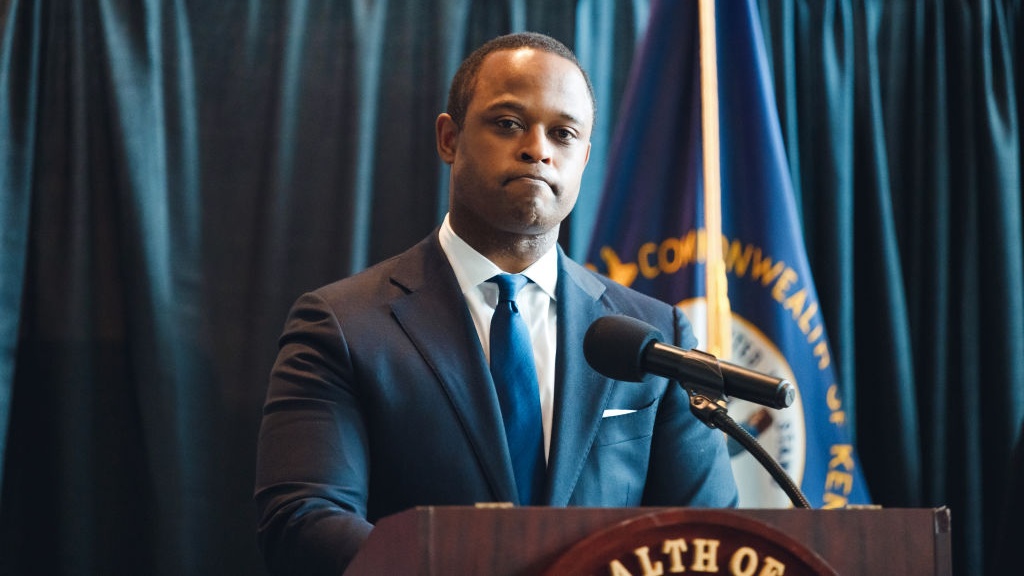No one is being charged for shooting and killing Breonna Taylor.
Kentucky Attorney General Daniel Cameron took the stage Wednesday afternoon shortly after charges were announced against Det. Brett Hankison. As Blavity previously reported, a grand jury indicted Hankinson on three counts of wanton endangerment in the first degree in relation to the March 13 police shooting that left Taylor dead. These charges are based on shots fired by Hankison that entered into a neighboring apartment. No charges were announced against Det. Myles Cosgrove or Sgt. Jonathan Mattingly, the other two officers who were present and fired the bullets that actually hit and killed Taylor.
The shuttering of government buildings and boarding up of other storefronts in Louisville on Monday made it apparent the city knew Wednesday's announcement would be exacerbated. Cameron's presser solidified this when he played his Black card and made reference to a political "narrative" driving public upset around Taylor's death.
The Attorney General faced a barrage of criticism since Taylor's killing as he seemingly dragged his feet in the investigation while appearing to leverage the high-profile case to raise his star within the Republican Party. With all this pressure, Cameron tried to balance explaining the grand jury and his own conclusions with showing respect and empathy for those who angrily disagree with those conclusions.
In the end, Cameron’s press conference failed. Here’s why:
1. He claimed he couldn’t inject his opinion into the case, then did so anyway.
Despite saying he was legally prohibited from making comments that could sway public opinion, Cameron went out of his way to offer his opinion that “justice is not often easy” and “does not often fit the mold of public opinion.”
In anticipation of protests to take place in response to the meager charges, Cameron presented his job as one which required him to "put emotions aside and investigate the facts.” Yet, he presented certain facts in a way that seemed to incorporate his own conclusions while rebuffing anticipated public criticisms.
"If we simply act on emotion or outrage, there is no justice…Mob justice is not justice.”
“Do we really want the truth, or do we want the truth that fits our narrative?" Cameron also asked.
His dismissal of opposing opinions dismisses the ways in which the “narrative” he denounces is actually the perspectives of people who have endured and witnessed racially-based traumas and whose opinions of the Taylor case are informed by these experiences.
Another peculiar moment took place when Cameron also concluded that the three officers had announced their presence as police officers based on the account of one witness, seemingly dismissing the accounts of multiple other witnesses who say they did not hear the police identify themselves.
2. He strangely criticized protestors, celebrities and activists.
While claiming that he was sticking to the facts of the case, Cameron also felt the need to call out public figures.
“There will be celebrities, influencers and activists who having never lived in Kentucky will try to tell us how to feel, suggesting they understand the facts, but they don't," the Trump endorsee said.
This unnecessary aside felt like a personal beef against celebrities who have been calling on him to take action, such as Beyoncé, who published an open letter in June calling for Cameron to take action in the case. The comment was also dismissive of his own community’s anger, implying that it was somehow being pumped in from outside.
3. He failed to clear up important details of the shooting.
How many times was Taylor shot? Who fired the bullet that killed her?
These are basic questions that were covered in the investigations into Taylor’s shooting, and yet Cameron left a lot of questions unanswered. He failed to adequately clear up a discrepancy over whether or not five or six bullets struck Taylor as she was mowed down in a hail of gunfire.
More importantly, while Cameron acknowledged the FBI had concluded that officer Cosgrove fired the bullet that actually killed Taylor, Cameron holds that his own investigation was inconclusive on that point, but that it didn’t matter because both Cosgrove and Mattingly allegedly fired in self-defense.
4. He was defensive on the role race played in the decision on charges.
Cameron made more than one reference to his Blackness, implying that his identity had some kind of important impact on his decisions in regards to his empathy toward the case. But he also used his own race to deflect from questions about the racial makeup of the grand jury. When asked about the races of the people who made the decisions related to charges in the case, Cameron defensively snapped back “I’m Black and I speak for the entire department. I hope that will satisfy that question.”
Cameron was always going to have a hard time justifying the decision to not charge anyone with the shooting death of Taylor. But his press conference did not do anything to sway people who see her killing as murder or view the Attorney General as unwilling to seek justice in her case. Cameron may continue to defend his decisions in the weeks to come. But the idea that no one did anything wrong by killing Taylor in a hail of bullets in her own apartment is more than just a “tragedy,” as Cameron repeatedly described it.
As Taylor family attorney Benjamin Crump described it minutes after the grand jury announcement, letting these officers off of the hook for Taylor’s death is “outrageous and offensive.”
